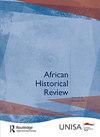Making Refuge: Somali Bantu Refugees and Lewiston, Maine, by Catherine Besteman
IF 0.1
Q3 HISTORY
引用次数: 0
Abstract
Somali Studies is very fortunate to have been blessed with a cultural anthropologist of the calibre of Catherine Besteman. A keen cultural anthropologist with one eye to explore and the other to examine a complicated case at hand without losing one to the other, Besteman is one of the very few nuanced non-Somali scholars examining Somali society, and is invariably to the point and brilliant in her incisive analysis and insights into the transition (and transformation) of Somali society. Besteman is also an exciting ethnographer who always offers original research findings, this because of her extensive fieldwork in the Bantu/Jareer Somali community in the United States and Somalia. She did fieldwork in southern Somalia in an early period of her academic life as a young, enthusiastic and interesting anthropologist. Unlike some others (in Somali Studies) who have not had direct field research exposure, Besteman lived and stayed in a small farming village on the banks of Bu’aale in Jubbada Dhexe (the Middle Jubba) region, to collect ethnographic data for her doctoral project. The culmination is two significant single-authored books and one co-edited book, as well as numerous essays, academic articles, and book chapters.《避难:索马里班图难民和缅因州刘易斯顿》,凯瑟琳·贝斯特曼著
索马里研究非常幸运地得到了凯瑟琳·贝斯特曼这样优秀的文化人类学家的祝福。贝斯曼是一位敏锐的文化人类学家,一只眼睛善于探索,另一只眼睛善于审视手头的复杂案例,同时又不失两者兼而有之。她是研究索马里社会的少数几位细致入微的非索马里学者之一,她对索马里社会转型(和转型)的深刻分析和见解总是一针见水,出神入化。贝斯曼也是一位令人兴奋的民族志学家,她总是提供原创的研究成果,这是因为她在美国和索马里的班图/贾里尔索马里社区进行了广泛的实地调查。作为一名年轻、热情、有趣的人类学家,她在学术生涯的早期曾在索马里南部进行过实地考察。与其他一些没有直接实地研究经历的人(从事索马里研究的人)不同,Besteman住在Jubbada Dhexe(中朱巴)地区Bu 'aale河岸上的一个小村庄,为她的博士项目收集人种学数据。本书的高潮是两本重要的单作者著作和一本合编的著作,以及大量的论文、学术文章和书籍章节。
本文章由计算机程序翻译,如有差异,请以英文原文为准。
求助全文
约1分钟内获得全文
求助全文

 求助内容:
求助内容: 应助结果提醒方式:
应助结果提醒方式:


